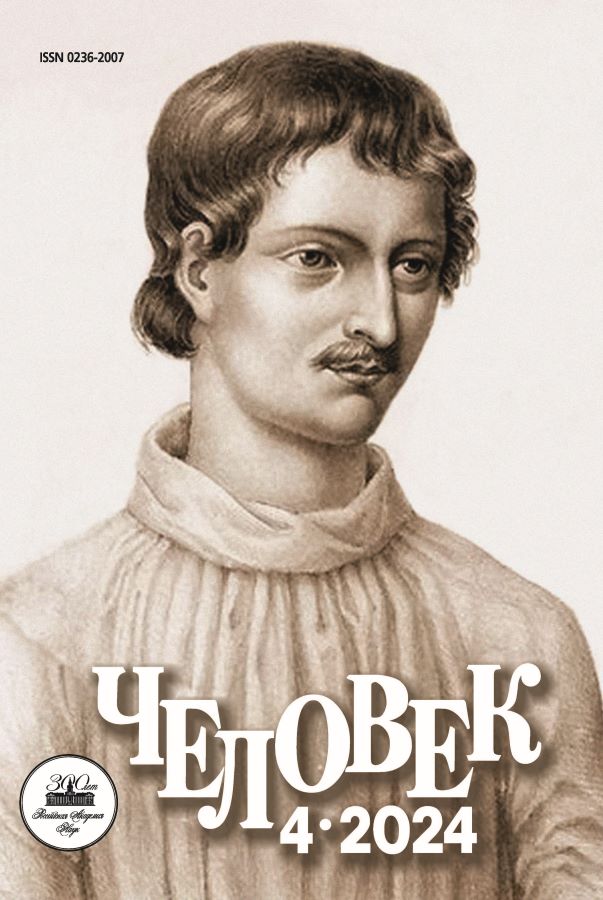The Formula of Man, or the Abstract Double of Phenomenology
- Autores: Miroshnichenko M.D.1
-
Afiliações:
- Higher School of Economics
- Edição: Volume 35, Nº 4 (2024)
- Páginas: 26-45
- Seção: The philosophy of the himan being
- URL: https://transsyst.ru/0236-2007/article/view/670792
- DOI: https://doi.org/10.31857/S0236200724040025
- ID: 670792
Citar
Texto integral
Resumo
Contemporary thinkers believe that human individuality is defined by an inhuman, abstract, and anonymous beginning emancipated from human experience, transforming thinking into one of multiple forms of existence. Inhumanism requires describing the structure of subjects capable of connecting to space or reasons. This structure includes abilities manifested through a technolinguistic infrastructure and algorithmic intelligence that intertwine abstraction and materiality. This explanation of consciousness redefines individuality through objective laws, relegating phenomenological understanding to the background. This paper explores scenarios of inhuman thinking, emphasizing the distinction between the scientific image’s epistemological primacy and the manifest image’s genetic precedence. It considers inhumanism as an alternative to phenomenology that seeks abstraction and liberation from corporeality and analyzes Soviet cybernetics’ approaches to extracting the inhuman component from mental life. The paper analyzes the philosophical and psychological ideas of Vladimir Lefebvre, including the desire to encrust consciousness with cosmological processes, which distinguishes his approach from posthumanist philosophers. Lefebvre seeks to integrate human consciousness with the cosmos, while posthumanists see humans through the lens of artificial intelligence and intelligent machines, emphasizing abstraction and the absolutism of pure concept. Both approaches offer a vision of human beings that goes beyond conventional understandings, affirming their connection to more complex cosmic entities. Lefebvre emphasizes the similarity of reflexive processes to recursive functions, where consciousness, returning to itself and possessing invariance, forms an objectified structure that distinguishes mental objects. He introduces the notion of the demiurge, eidos-navigator, as the object’s constructor, objectifying the scheme in materiality and allowing the observer to use this scheme for systemic representation.
Palavras-chave
Texto integral
Sobre autores
Maxim Miroshnichenko
Higher School of Economics
Autor responsável pela correspondência
Email: jaberwokky@gmail.com
ORCID ID: 0000-0003-1374-1599
Cand. Sc. in Philosophy, Researcher, School of Philosophy and Cultural Studies, Faculty of Humanities
Rússia, MoscowBibliografia
- Bennet J. Pul’sirujushhaja materija: politicheskaja jekologija veshhej [Vibrant Matter: The Political Ecology of Things]. Perm': Gile Press Publ., 2018.
- Wolfendale P. Racionalisticheskij ingumanizm [Rationalist Inhumanism]. Braidotti R., Hlavajova M. Postchelovek: glossarij [The Posthuman Glossary]. Moscow: Garazh Publ., 2023.
- Gasparyan D. Jazyk kak sobstvennaja forma (Eigenform) i rekursija oznachajushhih [Language as Eigenform and the Recursion of Signifiers]. Filosofskie nauki. 2018. N 8. P. 125‒143.
- Lefevr V.A. O samoorganizuyushchihsya i samorefleksivnyh sistemah i ih issledovanii [On Self-organizing and Self-reflexive Systems and their Study]. The problems of studying systems and structures: Conference proceedings. Moscow: Akademija Nauk SSSR Publ., 1965. P. 61–68.
- Lefevr V.A. Inzhenerno-psihologicheskie aspekty issledovanija refleksivnyh processov [Engineering-psychological Aspects of the Study of Reflexive Processes]. Moscow: Moscow State University Publ., 1971.
- Lefevr V.A. Konfliktujushhie struktury [The Conflicting Structures]. Moscow: Sovetskoe radio Publ., 1973.
- Lefevr V.A. Kosmicheskij subject [Cosmic Subject]. Moscow: Kogito-Center Publ., 2003. P. 135‒310.
- Lefevr V.A. Chto esli Platon byl prav? [What if Plato was Right?]. Refleksivnye processy i upravlenie. 2010. Vol. 10, N 1‒2. P. 23–32.
- Lefevr V.A. Chto takoe odushevlennost’? [What is Mentality?]. Moscow: Cogito Center Publ., 2012.
- Metzinger T. Tonnel’ Jego: nauka o mozge i mif o svoem Ja [The Ego Tunnel. The Science of the Mind and the Myth of the Self]. Мoscow: AST Publ., 2017.
- Hui Y. Rekursivnost’ i kontingentnost’ [Recursivity and Contingency]. Мoscow: V—A—C Press Publ., 2020.
- Shchedrovitsky G.P. Refleksiya i Lefevr. Iz doklada G.P. Shchedrovitskogo na seminare MMK (1972 g.) i kommentarij V.A. Lefevra [Reflexion and Lefevr. From G.P. Shchedrovitsky’s Report at the MMK Seminar (1972) and V.A. Lefevr’s Commentary]. Reflexive Processes and Management. 2006. Vol. 6, N 1. P. 5‒11.
- Brassier R. Nihil Unbound. L.: Palgrave Macmillan, 2007.
- Brassier R. Prometheanism and its Critics. #Accelerate: The Accelerationist Reader. Ed. by R. Mackay, A. Avanessian. Falmouth, Berlin: Urbanomic, 2014. P. 467–488.
- Churchland P.S. Touching a Nerve: The Self as Brain. NY, L.: W.W. Norton & Company, 2013.
- Foerster H. von. Understanding understanding: Essays on cybernetics and cognition. NY: Springer, 2003.
- Hansen M. The Media Entangled Phenomenology. Philosophy after Nature. Ed. by R. Braidotti and R. Dolphijn. L., NY: Rowman & Littlefield, 2017. P. 73–98.
- Harman G. Zero-Person and the Psyche. Mind That Abides: Panpsychism in the New Millennium. Ed. by D. Skrbina. Amsterdam, John Benjamins Publishing Company, 2006.
- Kauffman L. Reflexivity and Eigenform: The Shape of Process. Constructivist Foundations. 2009. Vol. 4, N 3. P. 121–137.
- Kolozova K. Capitalism’s Holocaust of Animals: A Non-Marxist Critique of Capital, Philosophy and Patriarchy. L., Bloomsbury Publishing, 2020.
- McGregor, S. Cognition is not exceptional. Adaptive Behavior. 2018. Vol. 26, N 1. P. 33–36.
- Negarestani R. Intelligence and Spirit. Urbanomic/Sequence Press, 2019.
- Negarestani, R. The Labour of the Inhuman. #Accelerate: The Accelerationist Reader. Ed. by R. Mackay, A. Avanessian. Falmouth, Berlin: Urbanomic, 2014. P. 425–466.
- Parisi L. Contagious Architecture: Computation, Aesthetics, and Space. L., Cambridge, Massachusetts: The MIT Press, 2013.
- Shildrick M. Why should our bodies end at the skin? Embodiment, boundaries, and somatechnics. Hypatia. 2015. Vol. 30, N 1. P. 13–29.
- Varela F.J. A Cognitive View of the Immune System. World Futures: Journal of General Evolution. 1994. Vol. 42. N 1–2. P. 31–40.
Arquivos suplementares











